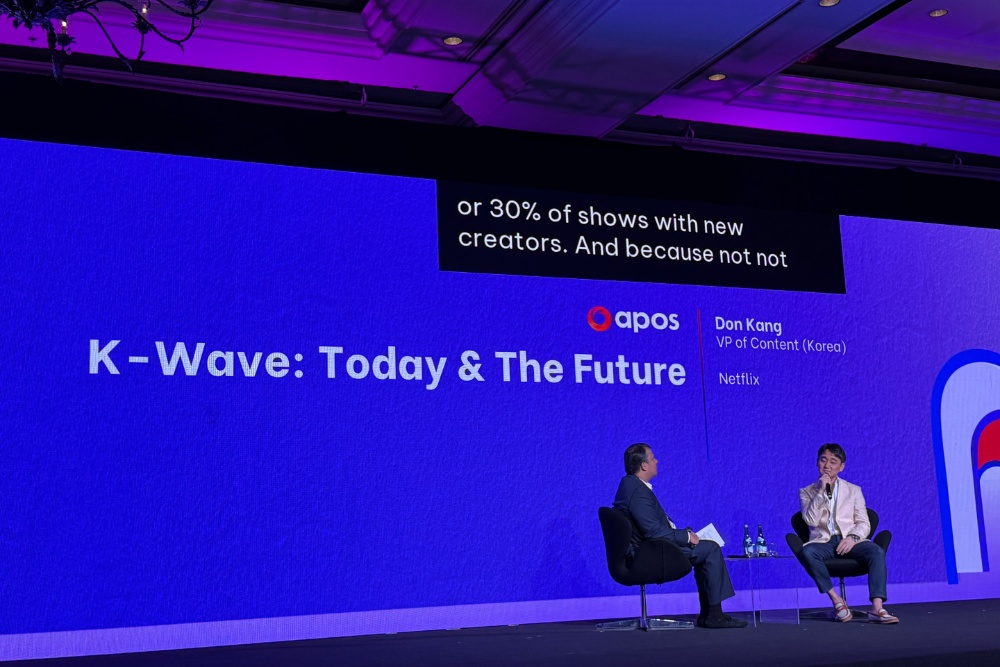As “Squid Game” Season 3 prepares to launch this Friday, Netflix Korea’s Don Kang is reflecting on an extraordinary journey that has transformed Korean content from a regional phenomenon into a global cultural force.
Speaking at the ongoing APOS conference in Indonesia, the Netflix VP of content for Korea outlined the streaming giant’s continued investment in Korean storytelling and discussed the broader cultural impact of K-content worldwide.
“Squid Game” Season 2 delivered massive numbers that underscore the franchise’s continued global appeal. The series garnered more than 190 million views in its premiere week alone, with over 60 million views in just the first week of availability. The show became Netflix’s biggest series in the second half of 2024 despite being available for only one week during that period.
“It was ranked number one in more than 92 countries,” Kang revealed. “So that’s basically most of the countries that we service.”
The three-year gap between seasons didn’t dampen audience enthusiasm. “There was a lot of people who turned out for Season 2,” Kang noted, emphasizing that the team is now focused on delivering “this great finale” rather than obsessing over performance metrics.
Netflix’s Korean content strategy has evolved significantly beyond traditional series. The platform also produces non-fiction shows like “Physical: 100” and “Culinary Class Wars,” romantic comedies, and an expanding film slate. This diversification aims to please existing Korean content fans while attracting new audiences.
“These Korean shows that we do have Korean elements in it,” Kang explained. “You get to watch Korean food. You get to watch the songs we sing, the places that we go to, and it really impacts the way the world sees and understands Korean culture.”
Kang dispelled the notion that Netflix’s Korean success stems from a calculated master plan. “The big myth is that there’s no data that really tells you what shows to make,” he said. “It’s really about art. It’s really about being in the game, being with the creators, understanding what kind of stories they want to tell.”
The approach focuses on working with local creators to tell authentic stories for local audiences – a strategy that has proven to have universal appeal. Netflix maintains a deliberate focus on discovering new talent, with 20-30% of their shows featuring new creators.
“We focus on local stories, working with local creators for the local audiences,” Kang emphasized. “And if we keep doing that, I think hopefully there will be many more [successes like “Squid Game”].”
A new Netflix study on cultural affinity reveals the measurable impact of Korean content on global perceptions. The research shows that Netflix members have significantly more positive opinions toward Korean culture compared to non-users, with increased willingness to explore Korean products and experiences.
More than 80% of Netflix members globally have watched Korean content and continue to seek it out. The study found that most K-content viewers in major markets including the US, Japan, India, France, and Brazil have been watching for two or more years, demonstrating long-term loyalty rather than fleeting interest.
Netflix users show twice the interest in watching K-content in the future compared to non-users, and demonstrate higher engagement across all aspects of Korean culture – from travel and food to music and fashion.
Addressing concerns about the Korean production ecosystem, Kang acknowledged current market fluctuations while expressing confidence in the industry’s long-term health. He referenced previous cycles when Korean content saw reduced demand from China, noting the industry emerged “stronger, with more of stories.”
“It’s a phase. It goes up and it goes down,” Kang said. “But I am very confident… it’s a time where we need to practice discipline in terms of managing cost, but we’ve done it before and will come out just stronger.”
More from
- Netflix Board Rejects Jay Hoag’s Resignation and Taps Ellie Mertz, Airbnb CFO and Former Netflix Exec, as New Director
- ‘Hades,’ ‘Monument Valley’ and More Indie Mobile Games Leaving Netflix as Streamer Continues Strategy Shift







